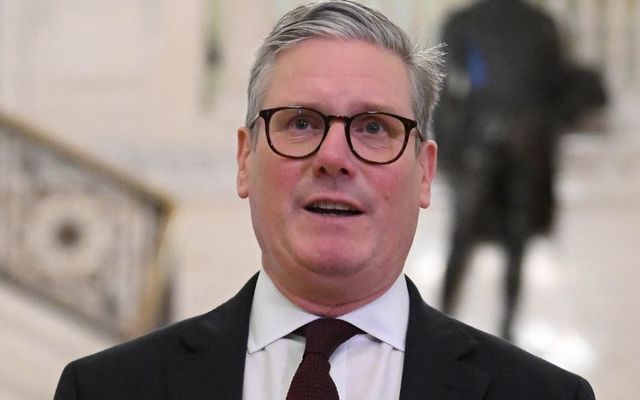Keir Starmer addressed the potential of a Border poll while in Northern Ireland on Monday, July 8 as part of a tour of the UK after being elected as the new British Prime Minister last Thursday.
“This is provided for by the Good Friday Agreement,” Starmer told reporters at Government Buildings in Belfast on Monday when asked about a potential Border poll.
“The framework is set out and I’m absolutely committed to the Good Friday Agreement.
“Today is a recommitment to that and to the approach and the role of the UK government and that is the honest broker.
“I am Prime Minister for the whole of the UK, elected into office just a few days ago.
“But to reaffirm the importance of the principles of the Good Friday Agreement is part and parcel of why I am here today.”
Starmer was elected the new British Prime Minister following Thursday's General Election across the United Kingdom. His Labour party clinched what is being described as a "landslide" victory over Conservatives, who had been in power for more than a decade.
In October last year, Starmer said an Irish border poll is "absolutely hypothetical" and "not even on the horizon." He had previously said that he would campaign for Northern Ireland to remain part of the UK if a referendum is held during his lifetime, stating that he would "make the case for the United Kingdom."
Starmer's comments in October drew some criticism from academics and pro-unity groups in Northern Ireland, but he appeared to offer a more diplomatic response on Monday in Belfast.
As per the Good Friday Agreement, Northern Ireland's Secretary of State has the power to call a border poll "if at any time it appears likely to him that a majority of those voting would express a wish that Northern Ireland should cease to be part of the United Kingdom and form part of a united Ireland."
On Saturday, Northern Ireland's new Secretary of State Hillary Benn, also a member of the UK Labour Party, told reporters in Belfast that believes "there is no evidence that that condition has been met" to call a border poll, adding that he is "not going to set out further criteria because there is the one criteria."
Meanwhile, Sinn Féin, Ireland's all-island nationalist party that campaigns on Irish unity, emerged as the biggest Northern Ireland party after last week's UK General Election.
Of the 18 Westminster seats that were up for grabs in Northern Ireland, Sinn Féin won the most, seven. The Democratic Unionist Party won five, the SDLP won two, and the Alliance Party, Ulster Unionist Party, Traditional Unionist Voice, and an Independent each won one seat.
(Sinn Féin, however, maintains a longstanding policy of not taking their seats in British Parliament, in part because it would require them to swear allegiance to the monarchy.)
In its manifesto for the UK General Election, Sinn Féin said in part: "The Irish and British governments must set a date for a referendum on Irish unity."
On Monday in Belfast, Starmer met with a Sinn Féin delegation that included Michelle O'Neill, the First Minister of Northern Ireland and the vice president of the party, and Mary Lou McDonald, the party's president.
O'Neill described Sinn Féin's engagements with Starmer on Monday as "productive."
Our Sinn Féin delegation held a productive meeting with the new British Prime Minister, Keir Starmer.
There are opportunities ahead for us to usher in a change in British-Irish relations to better the lives of all our people and communities.
We made a strong case for fair… pic.twitter.com/LZa1gnR9rw
— Michelle O’Neill (@moneillsf) July 8, 2024
McDonald similarly said Monday's meeting was "constructive" and "very friendly."
She went on to tell reporters: "What we can say without fear of contradiction is that the issue of reunification and referendums has never been more alive in Irish political discourse, right across the island.
"The Westminster election again reflected that all has changed here, and changing. The need for all of us to work together constructively and to plan for that future."
She added: "There is a lot of work to be done, and I think the context is good."
Today's meeting with new British Prime Minister Keir Starmer marks a historic change, offering a new opportunity to foster positive relations between Britain and Ireland.
We discussed many issues including the need for investment in health and public services, the issue of a… pic.twitter.com/AFla5Q8a6n
— Mary Lou McDonald (@MaryLouMcDonald) July 8, 2024




Comments